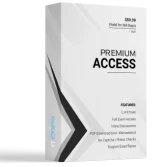Theresa Bair, CFA, a portfolio manager for Brinton Investment Company (BIC), has recently been promoted to lead portfolio manager for her firm's new small capitalization closed-end equity fund, the Quaker Fund. BIC is an asset management firm headquartered in Holland with regional offices in several other European countries.
After accepting the position, Bair received a letter from the three principals of BIC. The letter congratulated Bair on her accomplishment and new position with the firm and also provided some guidance as to her new role and the firm's expectations. Among other things, the letter stated the following:
"Because our firm is based in Holland and you will have clients located in many European countries, it is essential that you determine what laws and regulations are applicable to the management of this new fund. It is your responsibility to obtain this knowledge and comply with appropriate regulations. This is the first time we have offered a fund devoted solely to small capitalization securities, so we will observe your progress carefully. You will likely need to arrange for our sister companies to quietly buy and sell Quaker Fund shares over the first month of operations. This will provide sufficient price support to allow the fund to trade closer to its net asset value than other small-cap closed-end funds. Because these funds generally trade at a discount to net asset value, if our fund trades close to its net asset value, the market may perceive it as more desirable than similar funds managed by our competitors."
Bair heeded the advice from her firm's principals and collected information on the laws and regulations of three countries: Norway, Sweden, and Denmark. So far, all of the investors expressing interest in the Quaker Fund are from these areas. Based on her research, Bair decides the following policies are appropriate for the fund:
Note: Laws mentioned below are assumed for illustrative purposes. "¢ For clients located in Norway the fund will institute transaction crossing, since, unlike in Holland, the practice is not prohibited by securities laws or regulations.
The process will involve internally matching buy and sell orders from Norwegian clients whenever possible. This will reduce brokerage fees and improve the fund's overall performance. "¢ For clients located in Denmark, account statements that include the value of the clients' holdings, number of trades, and average daily trading volume will be generated on a monthly basis as required by Denmark's securities regulators, even though the laws in Holland only require such reports to be generated on a quarterly basis. "¢ For clients located in Sweden, the fund will not disclose differing levels of service that are available for investors based upon the size of their investment. This policy is consistent with the laws and regulations in Holland. Sweden's securities regulations do not cover this type of situation.
Three months after the inception of the fund, its market value has grown from $200 million to $300 million and Bair's performance has earned her a quarter-end bonus. Since it is now the end of the quarter, Bair is participating in conference calls with companies in her fund. Bair calls into the conference number for Swift
Petroleum. The meeting doesn't start for another five minutes, however, and as Bair waits, she hears the CEO and CFO of Swift discussing the huge earnings restatement that will be necessary for the financial statement from the previous quarter. The restatement will not be announced until the year's end, six months from now. Bair does not remind the officers that she can hear their conversation. Once the call has ended, Bair rushes to BIC's compliance officer to inform him of what she has learned during the conference call. Bair ignores the fact that two members of the firm's investment banking division are in the office while she is telling the compliance officer what happened on the conference call. The investment bankers then proceed to sell their personal holdings of Swift Petroleum stock.
After her meeting, Bair sells the Quaker Fund's holdings of Swift Petroleum stock.
With regard to the treatment of clients in Norway and Denmark, do the policies that Bair has selected for the Quaker Fund violate any CFA Institute Standards of
Professional Conduct?
Norway Denmark -

 31 days access 2.26 / day
31 days access 2.26 / day
 All Questions for 1 Exam
All Questions for 1 Exam
 Real Questions, Detailed Answers
Real Questions, Detailed Answers
 No Captcha / Robot Checks
No Captcha / Robot Checks
 Includes Exam Updates
Includes Exam Updates

 3 Months Access
3 Months Access
 All Questions for 1 Exam
All Questions for 1 Exam
 Real Questions, Detailed Answers
Real Questions, Detailed Answers
 No Captcha / Robot Checks
No Captcha / Robot Checks
 Includes Exam Updates
Includes Exam Updates